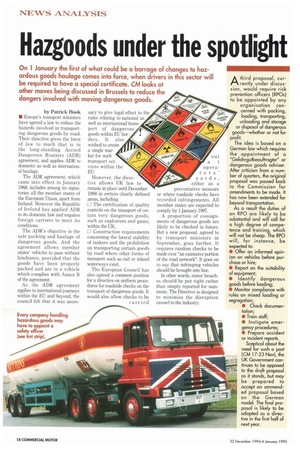A third proposal, currently under discussion, would require risk prevention officers
Page 20

If you've noticed an error in this article please click here to report it so we can fix it.
(RPOs) to be appointed by any organisation concerned with packing, loading, transporting, unloading and storage
or disposal of dangerous goods—whether or not for profit.
The idea is based on a German law which requires the appointment of a "Gefahrgutbeauftragter" or dangerous goods adviser. After criticism from a number of quarters, the original proposal was passed back to the Commission for amendments to be made. It has now been extended far beyond transportation. As a result the duties of an RPO are likely to be substantial and will call for a high degree of competence and training, which will not be cheap. The RPO will, for instance, be expected to:
• Offer an informed opinion on vehicles before purchase or hire; • Report on the suitability of equipment; • Identify dangerous goods before loading; • Monitor compliance with rules on mixed loading or segregation; • Check documentation; • Train staff; • Instigate emergency procedures; • Prepare accident or incident reports. Sceptical about the need for such a post (CM 17-23 Nov), the UK Government con
tinues to be opposed ni to the draft proposal as it stands, but may be prepared to accept an ammended proposal based on the German model. The final proposal is likely to be adopted as a directive in the first half of next year.
VINO




















































































































